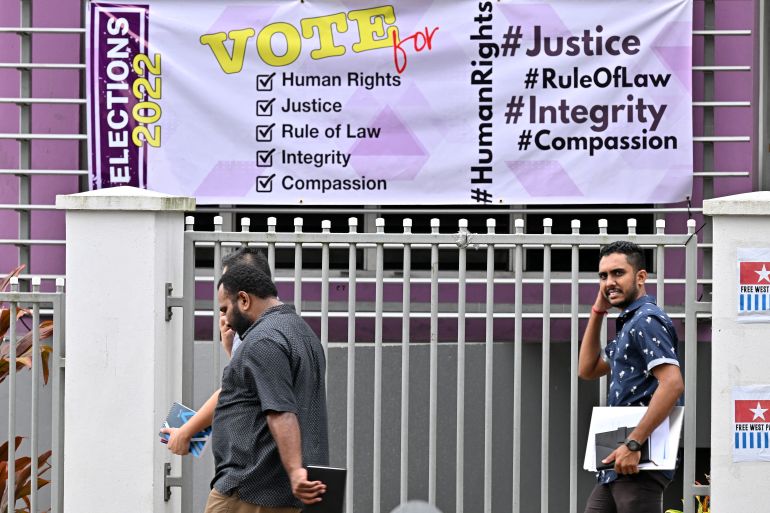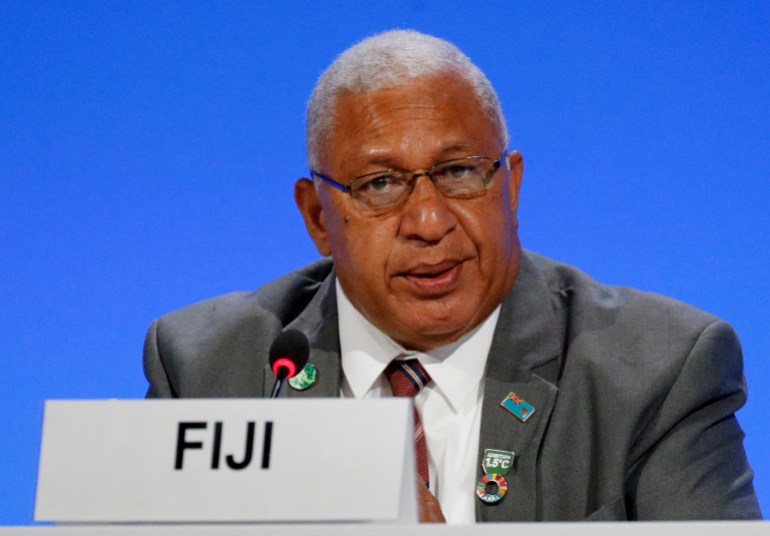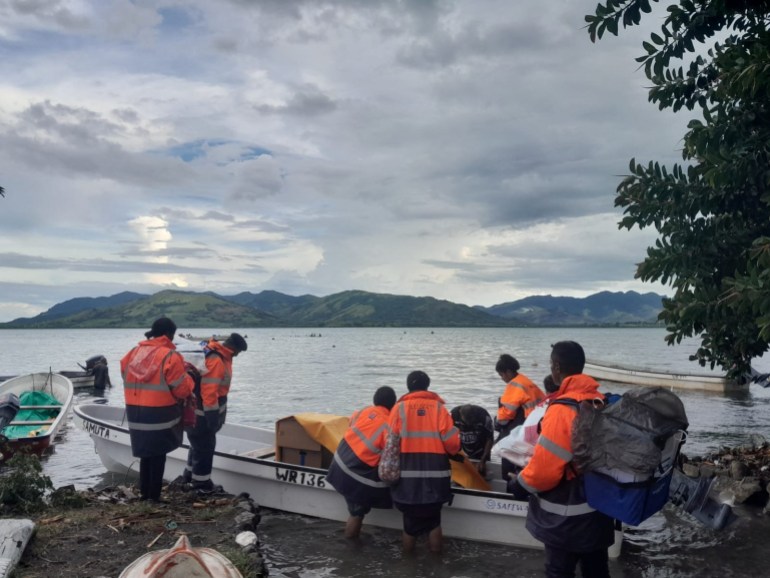Fijians set to vote in ‘toughest election yet’ for Bainimarama
Wednesday’s general election pits two former coup leaders in a test of Fiji’s fledgling democracy.

Voters in Fiji will head to the polls on Wednesday to elect a new parliament after a bitter race between two former coup leaders.
The general election pits Prime Minister Frank Bainimarama, who seized power in a bloodless coup in 2006, against longtime rival Sitiveni Rabuka, a former military commander who himself led two power grabs in the late 1980s.
Keep reading
list of 4 itemsChina eyes security pact in talks with Pacific islands in Fiji
Fiji to join Biden’s economic framework aimed at countering China
Fiji pauses US seizure of yacht linked to Russian oligarch
Bainimarama, 68, who has sought to manage the China-United States rivalry in the Pacific region and has championed efforts to tackle climate change, is seeking a third term in office via the ballot box.
His FijiFirst party comfortably won democratic elections in 2014 but fought to hold on to its majority in the following election in 2018.
Analysts say Bainimarama and his party are now facing their “toughest election yet”, with voters in Fiji increasingly concerned about the rising costs of living.
Inflation is hovering at 5 percent in Fiji, a tourism-reliant nation that has also been hit hard by the COVID-19 pandemic.
About a quarter of the country’s population of 900,000 people live in poverty, according to official figures.
Shailendra Singh from the University of the South Pacific told the AFP news agency that the high cost of living will weigh on voters minds.
“Rightly or wrongly, the government will get most of the blame for it, so I believe it will be a major determining factor in how people vote,” he said.

‘Most important election ever’
Voters are also concerned about a potential return to instability in a nation that has seen four coups in 35 years.
The power grabs were racially fuelled, with Indigenous Fijians fearful of losing political control to the economically powerful Indo-Fijian minority, who make up 35 percent of the country’s population and are descended from the ethnic Indians who were brought there to work in the sugarcane fields during the time when Britain colonised Fiji.
Rabuka, a former military chief, staged the first two of the power grabs in 1987 after a coalition dominated by Indo-Fijians won a general election. He went on to introduce a constitution enshrining political dominance for Indigenous Fijians in 1990 and to become prime minister after a general election in 1992.
Fiji later scrapped the 1990 constitution and introduced a non-discriminatory charter in 1997.
But the election of an Indo-Fijian as prime minister two years later reignited tensions and resulted in a third coup in 2000.
Bainimarama seized on the simmering tensions to justify his power grab in 2006. After assuming power, he moved quickly to abolish traditional, rival power bases, such as the ethnic Fijian Great Council of Chiefs, and pushed for equal rights for all Fijians. This culminated in a new constitution in 2013 that removed the country’s race-based electoral system, a move that won the former military chief support from the Indo-Fijian community.

But this year, Bainimarama’s main opponent, Rabuka has been trying to make inroads into the Indo-Fijian community by forming an alliance with the National Federation Party, which attracts a strong multi-racial vote.
“This is set to be the toughest election yet for Bainimarama,” wrote analysts Lucy Albiston and Blake Johnson in a recent blog post for the Australian Strategic Policy Institute.
“Although there are no reliable pre-election polls, it’s looking like Rabuka might win, forming a coalition with Fiji’s National Federation Party. The divide between Bainimarama and Rabuka used to be all about race, but Rabuka has consistently tried to demonstrate a change in his stance on Indo-Fijian rights since the 1987 coup. This year, it’s about social issues and government services,” they wrote.
Bainimarama, who has painted the election as the “most important election ever”, has sought to reassure Fijians of growth and prosperity.
“We know the stakes: our recovery, our jobs, family support, strong leadership that serves everyone equally,” the prime minister said during a campaign stop ahead of a pre-election media blackout.
Rabuka, meanwhile, said Fijians were ready for change and predicted victory was at hand.
“After 16 years of disastrous dictatorial rule, we’re coming very close to the end of it,” he told supporters. “We will be consigning them to the dustbin of history where they rightly belong.”
Observers say the military’s role will be key following Wednesday’s vote.
For now, the military has sought to allay fears of a military led-intervention, with Major General Jone Kalouniwai insisting that his forces will “honour the democratic process by respecting the outcome”.
A multinational observer group led by Australia, India and Indonesia will see about 90 election observers monitor polling booths and the national vote-counting centre.